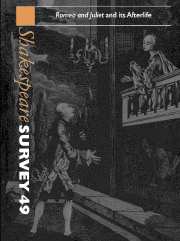Book contents
- Frontmatter
- The Challenges of Romeo and Juliet
- The Date and the Expected Venue of Romeo and Juliet
- The ‘Bad’ Quarto of Romeo and Juliet
- Shakespeare’s Romeo and Juliet: The Places of Invention
- ‘Death-marked love’: Desire and Presence in Romeo and Juliet
- Carnival and Death in Romeo and Juliet: A Bakhtinian Reading
- Ideology and the Feud in Romeo and Juliet
- Bawdy Puns and Lustful Virgins: The Legacy of Juliet’s Desire in Comedies of the Early 1600s
- Picturing Romeo and Juliet
- Nineteenth-Century Juliet
- ‘O, what learning is!’ Pedagogy and the Afterlife of Romeo and Juliet
- The Film Versions of Romeo and Juliet
- The Poetics of Paradox: Shakespeare’s Versus Zeffirelli’s Cultures of Violence
- ‘Lawful deed’: Consummation, Custom, and Law in All’s Well That Ends Well
- ‘Have you not read of some such thing?’ Sex and Sexual Stories in Othello
- French Leave, or Lear and the King of France
- The Actor as Artist: Harold Hobson’s Shakespearian Theatre Criticism
- Shakespeare Performances in England, 1994–1995
- Professional Shakespeare Productions in the British Isles, January-December 1994
- Critical Studies
- Shakespeare’s Life, Times, and Stage
- Editions and Textual Studies
- Books Received
- Index
The Actor as Artist: Harold Hobson’s Shakespearian Theatre Criticism
Published online by Cambridge University Press: 28 March 2007
- Frontmatter
- The Challenges of Romeo and Juliet
- The Date and the Expected Venue of Romeo and Juliet
- The ‘Bad’ Quarto of Romeo and Juliet
- Shakespeare’s Romeo and Juliet: The Places of Invention
- ‘Death-marked love’: Desire and Presence in Romeo and Juliet
- Carnival and Death in Romeo and Juliet: A Bakhtinian Reading
- Ideology and the Feud in Romeo and Juliet
- Bawdy Puns and Lustful Virgins: The Legacy of Juliet’s Desire in Comedies of the Early 1600s
- Picturing Romeo and Juliet
- Nineteenth-Century Juliet
- ‘O, what learning is!’ Pedagogy and the Afterlife of Romeo and Juliet
- The Film Versions of Romeo and Juliet
- The Poetics of Paradox: Shakespeare’s Versus Zeffirelli’s Cultures of Violence
- ‘Lawful deed’: Consummation, Custom, and Law in All’s Well That Ends Well
- ‘Have you not read of some such thing?’ Sex and Sexual Stories in Othello
- French Leave, or Lear and the King of France
- The Actor as Artist: Harold Hobson’s Shakespearian Theatre Criticism
- Shakespeare Performances in England, 1994–1995
- Professional Shakespeare Productions in the British Isles, January-December 1994
- Critical Studies
- Shakespeare’s Life, Times, and Stage
- Editions and Textual Studies
- Books Received
- Index
Summary
Harold Hobson, the first recipient of a knighthood for theatre criticism (in 1977) and the drama critic of The Sunday Times from 1947 to 1976, is best remembered today for his discovery of Harold Pinter’s The Birthday Party, his critical jousting with his great rival, Kenneth Tynan of the Observer, and his championing of Absurdist drama, notably the work of Beckett. This article aims to demonstrate that these well-known preoccupations were less important for Hobson’s critical practice than his belief that it was his critical duty to provide a historical record of what he had witnessed and that the actor was the pre-eminent member of the theatrical triumvirate of actor, director and playwright. These two critical edicts are most evident in Hobson’s review of performances of Shakespeare.
Hobson's first actual review of a Shakespearian production, submitted as a freelancer to the Christian Science Monitor in 1930, shortly after corning down from Oriel College, Oxford, provides an early indication of his desire to elevate the importance of the performer above that of the director and even the playwright. The review, blandly entitled '“Macbeth” at Oxford', is a formulaic account of the Easter production of the Oxford University Dramatic Society, which commences with an extensive listing of all the participants.
- Type
- Chapter
- Information
- Shakespeare Survey , pp. 225 - 234Publisher: Cambridge University PressPrint publication year: 1996
- 1
- Cited by

